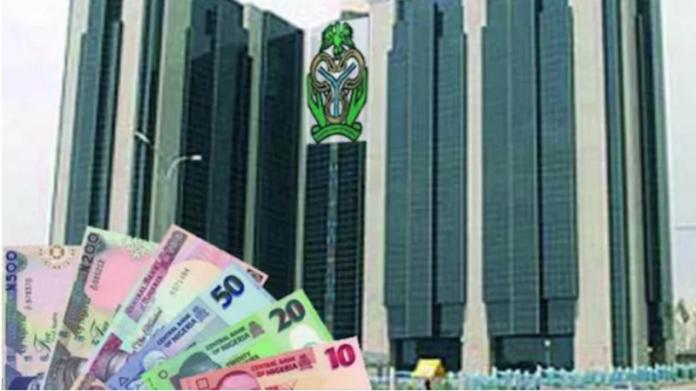Following the consistent increase in Monetary Policy Rate (MPR), by the Central Bank of Nigeria (CBN), nine Deposit Money Banks (DMBs) in the country reported a whopping N4.05 trillion interest income from loans & advances to customers, Investment securities and Loans and advances to banks in nine months of 2023.
This represents an increase of 67 per cent over N2.43 trillion recorded in the corresponding period of 2022.
The nine DMBs are: Access Holdings Plc, United Bank for Africa (UBA), Guaranty Trust Holding Plc (GTCO), Zenith Bank Plc, FBN Holdings Plc, Fidelity Bank Plc, Stanbic IBTC Holding Plc, Sterling Financial Holdings Company Plc and Unity Bank Plc.
MPR is the baseline interest rate in an economy, every other interest rate used within an economy is built on it.
The CBN had in July 2023 raised its benchmark interest rate to 18.75 per cent from 18.5 per cent in a bid to curb inflation.
In January, the Monetary Policy Committee (MPC) of the CBN raised the benchmark lending rate from 16.5 per cent to 17.5 per cent in a sustained push to control inflation and ease pressure on the naira.
According to National Bureau of Statistics (NBS), the annual inflation rate rose to 26.72 per cent Year-on-Year (YoY)in September 2023 from 20.77 per cent Y-o-Y September 2022, reflecting continued increase in prices of goods and services across the country.
With the increase in MPR, money market indicator of CBN revealed that the average maximum lending rate in the banking sector increased to 27.24 per cent in September 2023 from 28.06 per cent reported by CBN in September 2022.
Maximum lending rate refers to the rate charged by banks for lending to customers with low credit rating. In addition, average prime lending rate moved to 14.32 per cent in September 2023 from 12.23per cent in September 2022.
A prime rate or prime lending rate is an interest rate used by banks, usually the interest rate at which banks lend to customers with good credit.
In the period under review, Access Holdings, Zenith Bank and UBA recorded the highest interest income among other investigated DMBs.
Analysis of the banks’ results showed that Access Holdings alone recorded N1.05 trillion interest income in nine months of 2023, representing an increase of 83.4 per cent from N571.74billion in nine months of 2022. Interest income from loans and advances to customers contributed N458.41billion in nine months of 2023 from N352.01billion in corresponding period.
Zenith Bank reported N670.93 billion interest income in nine months of 2023, a growth of 71.7 per cent from N390.78 billion in nine months of 2023, while UBA’s interest income stood at N666.29 billion from N420.23 billion in nine months of 2022.
The nine DMBs interest expenses stood at N1.74trillion in nine months of 2023 from N883.7 billion in nine months of 2022, according to THISDAY investigations.
Recently, the CBN disclosed that interest rate on savings is the highest since 2006 stressing that the development is as a result of the double-digit inflation rate.
Meanwhile, analysts believe the average lending rate in the banking sector has increased amid hike in MPR to 18.75 per cent.
JPMorgan Chase & Co, in a report disclosed that its economists expected the CBN to maintain the MPR at 18.75 per cent for the foreseeable future.
But the Director/Chief Executive Officer · Centre for the Promotion of Private Enterprise (CPPE), Mr Muda Yusuf explained that the victims 18.75 per cent MPR are the investors in the real economy and other entrepreneurs in the economy.
He said the MPR at 18.75 per cent is another additional burden on business as it has resulted in a spike in cost of credit.
According to him, “Interest rate on loans will increase, production costs will increase, sales will drop, profit margins will shrink and investors’ confidence will be negatively impacted.”
He urged the CBN to pay greater attention to financial system stability at this time.
“Recent developments in the global financial system underscores the imperative of cautious interest rate hikes,” he added.
Speaking the Chief Research Officer, InvestData Consulting Limited, Mr. Omordion Ambrose said, “Businesses need a lot of credit facilities to survive, but in an environment where the lending rate is astronomical, many enterprises, especially small and medium-scale, might find it extremely difficult to survive as their products will remain uncompetitive and the cost of production and the sale prices to consumers will remain high.”
He added that, “A hike in interest rate is often considered a manufacturers’ nightmare as it stifles productivity and expansion. A hike in interest rate slows down productivity, as manufacturers struggle to keep machinery in operations and pay salaries. Those who look forward to borrowing for expansion and production will have to shelve such ideas in the face of the high cost of accessing funds.”
Mr. Folashodun Shonubi, who chaired the MPC meeting before the confirmation of Dr. Olayemi Cardosoat as the CBN governor stated that the moderate rate hike is to sustain efforts at anchoring inflation expectations, narrow the negative real interest rate gap and improve investor confidence.
He also said members agreed unanimously that the previous rate hikes have been effective in moderating the rate of price increases.





















